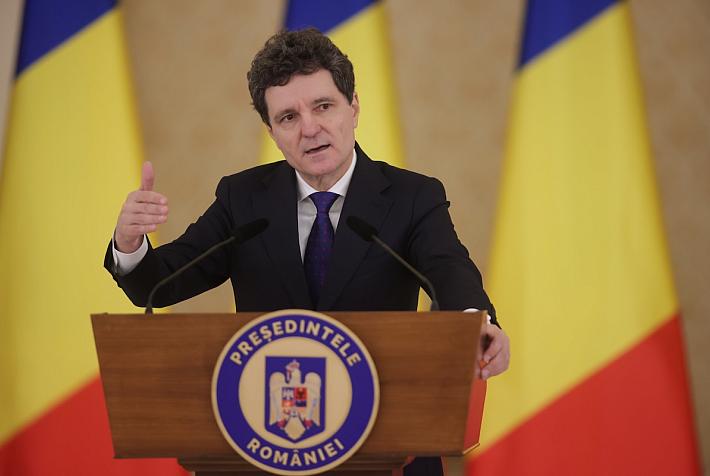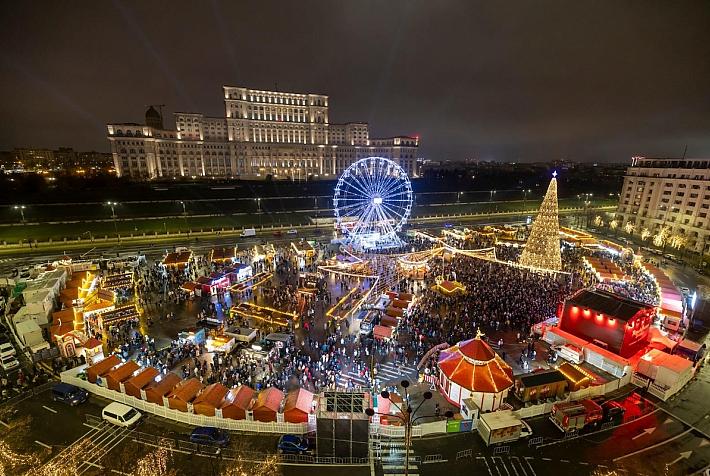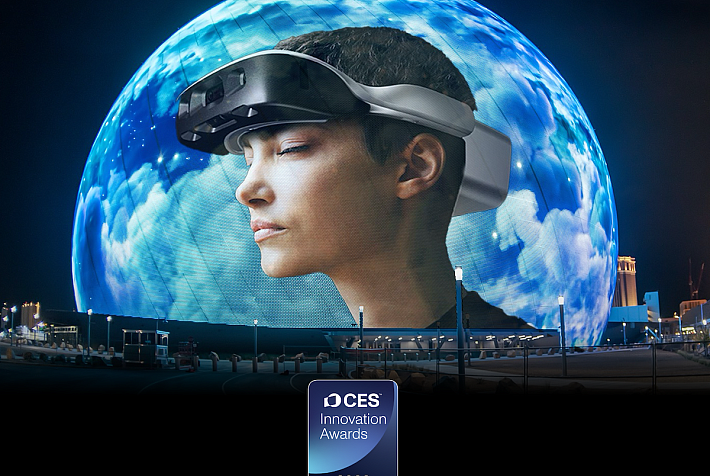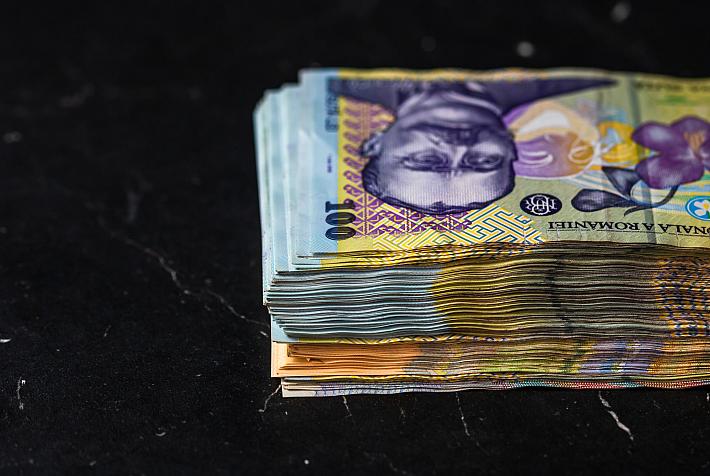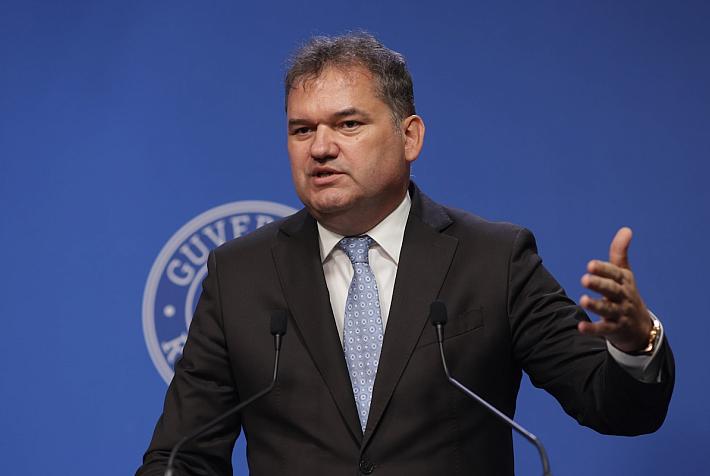Low-profile World Bank high official with Egypt roots makes Bucharest home
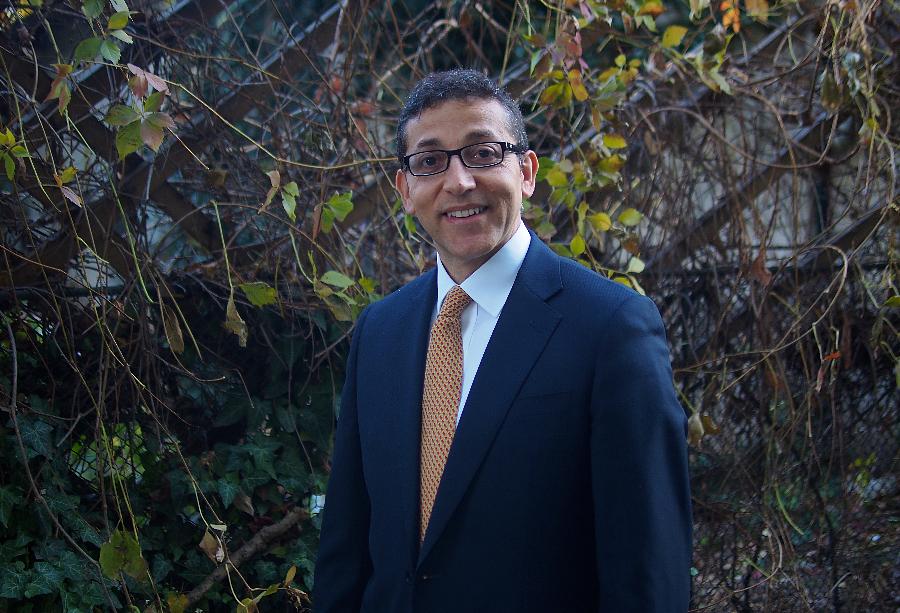
As a teenager in Cairo, Ismail Radwan, now World Bank Country Program Coordinator for Central Europe and the Baltics, wanted to understand what makes countries rich and what makes them poor.
The tour guide, a 40-something man with completely white hair and a low voice, talks passionately about the Art Nouveau architectural details in downtown Bucharest. At the end of the 19th century, a few decades after the country won its independence, Romania was still a conservative country, with moral principles that contravened with the flamboyant, liberating Art Nouveau style. But little details, like gates with exuberating flowery motives, did manage to sneak in. Ismail Radwan, accompanied by his two sons and his wife, is listening attentively to the stories about Bucharest from over a century ago. Unlike the other days of the week, when he wears a suit due to his job as World Bank’s country program coordinator for Romania and other countries in the region, he is now dressed casually. He has a rather short stature, which somehow fits his discreet personality. The man blends in inconspicuously, listening carefully to what others say. This low-profile attitude not only helps him understand what happens around him, but also enables him to make poignant observations without creating too much torment.
At the end of October, a few months into his office, Ismail Radwan talked at the Foreign Investors Forum in Bucharest. He said that Romania’s judicial system should focus on the stolen goods, which needs to be seized and recovered, so that the people get back their money. This was not the kind of cautious statement that employees of international institutions usually make.
“I get into trouble sometimes,” he says very calmly. “But I see myself as an agent of change. I am here to change the society. I am not here to pick up a salary, go home and play safe.”
“My message was that you are on the right track, but this is the next step,” he adds. “I really do believe that Romania is making a tremendous effort on anti-corruption. It’s kind of a miracle that the DNA (anticorruption office, e.n.) are doing what they are doing.”
Ismail took his office in Bucharest this summer. He didn’t mind the high temperatures, but actually thought it was fantastic. “It wasn't that hot, maybe 30, 35 degrees Celsius,” Ismail says. He’s born in Cairo, so hot weather does not bother him. Egypt has a hot desert climate, and the climate is very dry all over the country except on the northern Mediterranean coast. Ismail lived and worked in more than 30 countries, so he had to grow used to different climates: the foggy climate of London, where he went to a boarding school in high school, Washington DC, with its hot, humid summers, where he worked for several years or the tropical Sri Lanka, where Ismail went after the tsunami to work at the country’s reconstruction in 2004. His calm, windless personality proved helpful in over-the-edge situations. He spent four years based in tropical hot Nigeria where he led the Bank's post financial crisis interventions in West Africa.
Ismail has been working in development for many decades. He has been part of the World Bank team since 2000 and before that he had worked for PricewaterhouseCoopers as consultant. After going to high school in London, he returned for one year to Cairo, to live with his grandparents, as he wanted to improve his Arabic that was a little bit shaky. He was struck by how poor Egypt was in comparison to Great Britain. “Egypt’s whole GDP is half of what the UK spends on just the health service,” he says. Ismail was wondering what makes the difference, what makes countries rich and what makes them poor. That’s how he decided that he wanted to be active in development and eventually ended up working for the World Bank.
The World Bank was set up at the end of World War II as many European and Asian countries needing financing for their reconstruction. Another reason for its establishment was the crisis which swept many countries in the 30s, in what was known as the Great Depression. To avoid such mass economic distress, states created a new international monetary system in 1944, which included the creation of the World Bank. The institution grants loans and technical and financial expertise. The World Bank now assists Romania in reducing poverty and fostering sustainable income growth for the bottom 40 percent of the population.
Ismail Radwan thinks it has been a choice to work in this field. He has a twin sister, who works in the corporate finance sector in London. “She’s the counter example of what I could have done if I had made different choices. I can see what it is to make lots and lots of money,” he says laughing.
But in life you realize you don’t need a lot of money to be happy, Ismail explains. The small things, spending time with the family, cycling to the office from Baneasa in Northern Bucharest every morning, that’s what makes him happy. He’s a family guy, he admits laughing. “Some people would say that what I’m doing it’s a very boring life.” He doesn’t mind.
***
“This house has a Little Paris classic architecture, which later accommodated some Art Nouveau elements,” the guide explains to the group of ten people, including Ismail and his family. “It is quite common for Bucharest’s old architecture, and also symbolic. As history and fashion were changing, new layers were added to the traditional architecture of a house.” Ismail’s two boys are only 10 and 12, but they don’t seem bored about the architectural stories. Strong, healthy boys, wearing jeans and t-shirts, despite the chilly weather, they listen very carefully to the man who explains the difference between Art Nouveau and Art Deco.
“We more or less treat our kids as adults. When we have dinner parties they stay with us,” Ismail says. He wants his boys to be independent, just like he was when he was growing up in Cairo. He and his sister had very independent lives. “We would disappear after school and go play with our friends.” Parents are too protective nowadays, he thinks.
The big, Art Deco house where Ismail grew up in Cairo accommodated several generations. In the 60s and 70s it was still common for families to live together and add an extra floor for newly weds. But slowly, young families started to move out and live independently. It was the same process in his own family. In the end, his grandmother ended up living in the big house by herself. They decided to sell the house and she bought an apartment.
Their old house, with simple lines and one side that looked like an ocean liner, was bought by the Austrian Embassy. It was later sold to an arms dealer, who built very high walls outside. “A very shady character,” Ismail says.
Some years later, his mother met a woman at a cocktail party. The woman invited Ismail’s mom at her house for dinner and gave her the address. “It was the address of my father's old house,” Ismail says. “<<Do you know how to get there?>>, the women asked. <<I know how to get there,>> my mother replied.” That dinner party actually took place on the 40th anniversary of his parents' wedding. They got married in that house and put a tent in the garden. Forty years later, Ismail’s mom went to the same house that now hosted the dinner party organized by some stranger.
“It's a kind of picture of what has happened in Egypt. A lot of old families, educated people have disappeared and have given new way to people who made money in very shady ways,” Ismail says.
In 1952, a group of army officers overthrew King Faruq of Egypt and abolished the constitutional monarchy and aristocracy of Egypt and Sudan, establishing a Republic. They ended the British occupation of the country. The new government adopted a nationalist, anti-imperialist agenda. Ismail’s grandfather, from his father’s side, was the king’s physician, so the times after the revolution weren’t great for him. Ismail’s other grandfather was professor of law and Minister of Justice. After the revolution he wrote the new constitution. He was Ismail’s role model. “He was far ahead of his time. He had studied in Rome for his PhD. That must have been in the early part of the 20th century. There’s was no air travel so he had to take the boat across the Mediterranean. Later on he started a law office in Zurich.” Ismail lived with him for one year in the 80s, right before he started university. The grandfather tried to influence him a bit about his career. “He thought the computers were the future and he was actually right. But I didn’t take his advice,” Ismail says.
For the generation of his parents, social norms were very important. There was more conformity and less freedom of expression. His own generation is a little bit in between, Ismail says. “I’m Generation X, born right after the baby boom generation.” As he was growing up, people were frightened because of the cold war. There were nuclear threats all the time. “I remember there was a big anniversary of Hiroshima in 1985; a lot of films about nuclear wars. You could think that something was going to happen. Those were very anxious times.”
The young people are now different, Ismail says. “They are more responsible about the environment, more optimistic and less cynical.” He writes in one of his blog posts: “I've also been amazed at how socially conscious today's youth are -many are as motivated or even more motivated by making a change in their societies as they are by making money. And there is no reason why the two cannot go hand in hand.”
By Diana Mesesan, features writer, diana@romania-insider.com






